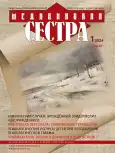The use of modern educational technologies in the training of midwives and nurses
- 作者: Ponkina N.P.1, Savina L.V.1, Sizova T.V.1
-
隶属关系:
- FGB POU “Obstetrical College”
- 期: 卷 26, 编号 1 (2024)
- 页面: 49-52
- 栏目: Education: problems and solutions
- URL: https://journal-vniispk.ru/0025-8342/article/view/254110
- DOI: https://doi.org/10.29296/25879979-2024-01-11
- ID: 254110
如何引用文章
详细
The article presents the experience of teachers in the training of future midwives and nurses and substantiates the need to use modern educational technologies in the educational process. Currently, the problem of training highly professional and competitive medical workers with secondary medical education in the labor market is becoming particularly relevant, since the requirements for the level of professional knowledge, skills and abilities of medical personnel are increasing every year. The main task of a teacher is not a simple transfer of knowledge, but the motivation of students to take initiative and find ways to apply the knowledge gained in solving various problematic tasks, the formation of a specialist’s personality capable of constant self-development. At the same time, it should be borne in mind that today’s students are representatives of the “digital generation”. These are people who cannot imagine themselves without the Internet, smartphone and social networks. “Buzzers” are more difficult to assimilate and remember information, because all the information is on the Internet. Many students do not know how to build and ask questions based on the material they have read. In the classroom, the teacher must comprehensively ensure the quality of the educational process using modern information technologies and active learning methods based on the principles of “learning through action”, which necessarily imply the development of independence for students. The more active the learning process, the more zoomers are involved in it. The insertion technique or technology of active reading helps students to understand, comprehend and remember the information received.
The use of various technologies in practical classes in obstetrics and gynecology that immerse students in professional activities, such as: solving situational problems, case-study, performing manipulations according to an algorithm, conducting role-playing games and lesson conferences, allows you to set an incentive and simulate the conditions for the formation of a specialist’s personality in teaching a future profession.
The participation of students in the organization and conduct of role-playing games increases their creative activity, contributes to the formation of professional and communicative competencies.
The modern educational technologies used by us in the educational process make it possible to lay the foundation for the professional competence of a specialist, to activate the cognitive activity of students, making them active participants in the educational process, which contributes to improving the effectiveness of professional training.
作者简介
Nadezhda Ponkina
FGB POU “Obstetrical College”
编辑信件的主要联系方式.
Email: ponkinan@bk.ru
ORCID iD: 0009-0008-7124-7760
gynecologist, teacher
俄罗斯联邦, Saint-PetersburgLudmila Savina
FGB POU “Obstetrical College”
Email: medsestra@rusvrach.ru
gynecologist, teacher
俄罗斯联邦, Saint-PetersburgTatiana Sizova
FGB POU “Obstetrical College”
Email: medsestra@rusvrach.ru
gynecologist, teacher
俄罗斯联邦, Saint-Petersburg参考
- Khromova I.A. Preparation of competitive specialist as a goal of modern education. Theory and practice of education in the modern world: materials of the VIII International Scientific Conference. St. Petersburg: Svoye publishing house. 2016; 141–143.
- Gurina I.A., Bolatova Z.A. Professional self-determination and employment of students of professional educational organizations. Modern problems of science and education. 2022; (4): 48.
- Zaitseva, N.A. Theory of generations: are we different or the same? Russian regions: a look into the future. 2015; 2 (2): 220‒236.
- Egorova E.V. Peculiarities of motivation of students of generation Z at mixed learning. International journal of experimental education. 2022; (6): 20–25; URL: https://expeducation.ru/ru/article/view?id=12105 (date of reference: 01.01.2024).
- Mityagina, E.V., Dolgopolova, N.S. «Clip consciousness» of youth in the modern information society. Vestnik Nizhny Novgorod University named after N. I. Lobachevsky. Series Social Sciences. 2009; 15 (3): 53‒59.
- Sorokoumova E.A., Puchkova E.B., Cherdymova E.I. et al. Toward the issue of teaching digital generation students. Pedagogy and psychology of education. 2022; (4): 109‒125.
- Granik G.G. When the book teaches / G.G. Granik, S.M. Bondarenko, L.A. Kontsevaya. Moscow: Pedagogika. 2018; 192 с.
- Zagashev, I.O. Critical thinking: technology of development. SPb. «Izdatelstvo». 2012.
- Plastinina Y.V. Research of the effectiveness of students’ perception of information from printed and electronic sources / Y.V. Plastinina, T.V. Nosakova. ITON-2017: Proceedings of the International Scientific and Practical Conference, Kazan, November 4-6, 2017 / edited by Y.G. Ignatyev. Kazan: Academy of Sciences of the Republic of Tatarstan. 2017; 201‒207.
- Yavorskaya S.D., Nikolaeva N.G., Bolgova T.A. et al. Innovative methods of teaching students of medical universities. Modern problems of science and education. 2016; (4): 72–76.
- Titarenko N.V. Role-playing games of problem orientation as a way to improve the effectiveness of training. Secondary professional education. 2017; (4): 25–27.
补充文件








